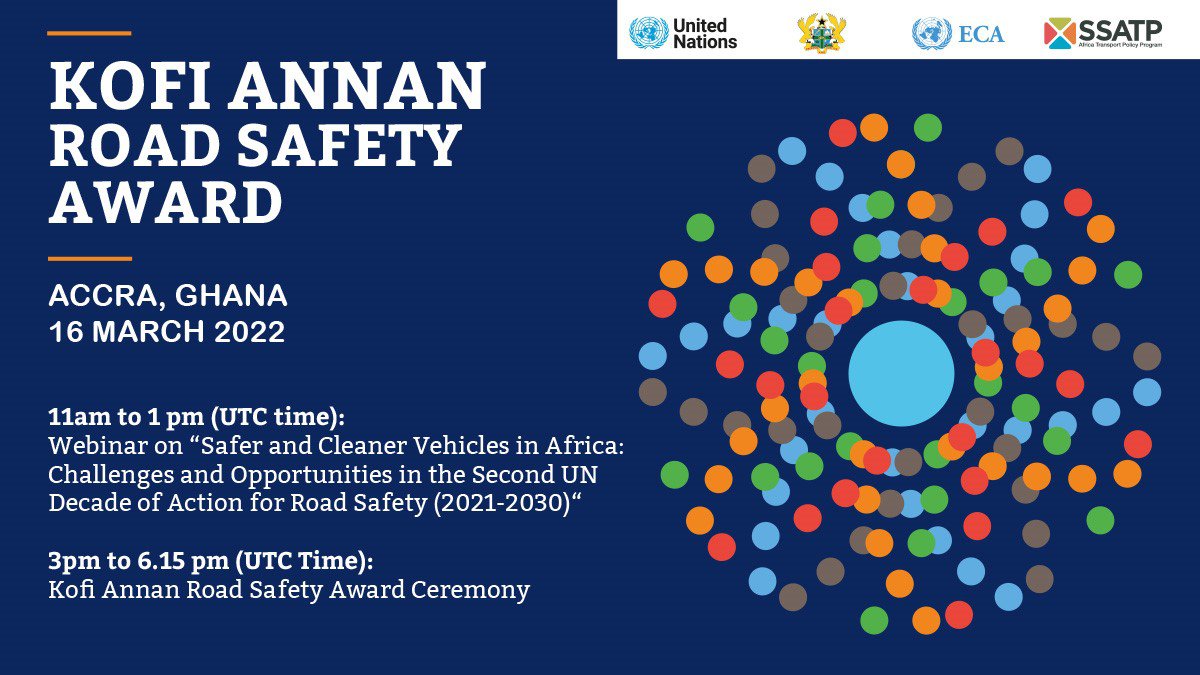KOFI ANNAN ROAD SAFETY AWARD WEBINAR ON SAFER AND CLEANER VEHICLES IN AFRICA
published: Sept. 29, 2022, 1:52 p.m.
(Accra, March 16, 2022) A webinar was held for road safety management with distinguished panel of speakers across the continent who explored the challenges and opportunities for importing safer and cleaner vehicles to Africa. The Webinar which was well attended was under the theme “Safer and Cleaner Vehicles in Africa: Challenges and Opportunities in the Second UN Decade of Action for Road Safety (2021 -2030)”
This provided a platform for participants to exchange views on the safety of vehicles in Africa within the context of the continent’s post-2020 strategic direction for road safety and its Road Safety Action Plan for 2021-2030, and discuss the vehicle safety dimension of the Global Plan of Action for the Second UN Decade for Road Safety (2021-2030), and UN vehicle regulations and their implications for the safety of Africa’s roads.
It was a general consensus throughout the session that almost the entire African continent imports used vehicles to meet the increasing mobility needs of its citizens. While the used vehicles market can provide cheaper access to safer and cleaner fleets, the lack of minimum quality standards for used vehicle imports to Africa has been detrimental, contributing to increased road crashes and greenhouse gas emissions in recipient countries and for Africa’s roads to be safer, there is the need for policy change to demand for vehicle standards to be upgraded and improved to eventually wipe out used cars which have potential for crashes.
In a statement addressing the gathering, the Minister for Transport, Hon. Kwaku Ofori Asiamah, reiterated the notion that, a large number of Africa’s imported vehicles are used vehicles. He added that, over 80% of these imported vehicles are used ones (second-hand), comparing Ghana’s situation to other African countries.
Hon. Asiamah stated further that, most of these imports come from Europe, Asia, the Middle East and the United States of America with varying export regulations. He identified that a common agenda to standardize and harmonize vehicle import regulations and standardization in order to protect our markets from dumping of scraps or vehicles not fit for purpose.
He emphasized the Government of Ghana’s commitment to the promotion of cleaner and safer vehicles while calling for the support and expertise of all players.
Dr. Vera Songwe, UN Under-Secretary-General and Executive Secretary of the Economic Commission for Africa decried the generally old vehicle fleets of African countries. She revealed that the large percentage of these fleet types on our roads are the reason for our unsafe roads. “95% of Angola’s fleet is made up of used cars, 85% of Ethiopia’s fleet is made up of used cars. The average age of vehicles in Ethiopia is almost 20 years. In Zimbabwe, there has been an increase from 800,000 in 2010 to 1.5 million today, in used cars. In each one of these used cars is a potential for accident.” Used vehicles are killing our people and becoming a burden on our health sector, Vera Songwe stated.
It is important that talking about road safety and tackling the problem, we must get to the root cause of the issue. These vehicles that are not fit for our roads must take the forefront in our advocacy, so that policy makers will buy into and direct policy action that will take these cars off Africa’s roads.
During discussions, it was revealed that countries that had imposed restrictions on importation of used vehicles have not experienced a decline or shortage in vehicle numbers. Moving forward, road audits and vehicles audits must be taken seriously.
The maiden Kofi Annan Road Safety Award came off in Accra to recognize governments, private sector, civil society and other organizations as well as individuals who have made outstanding contributions to Road Safety in Africa.

